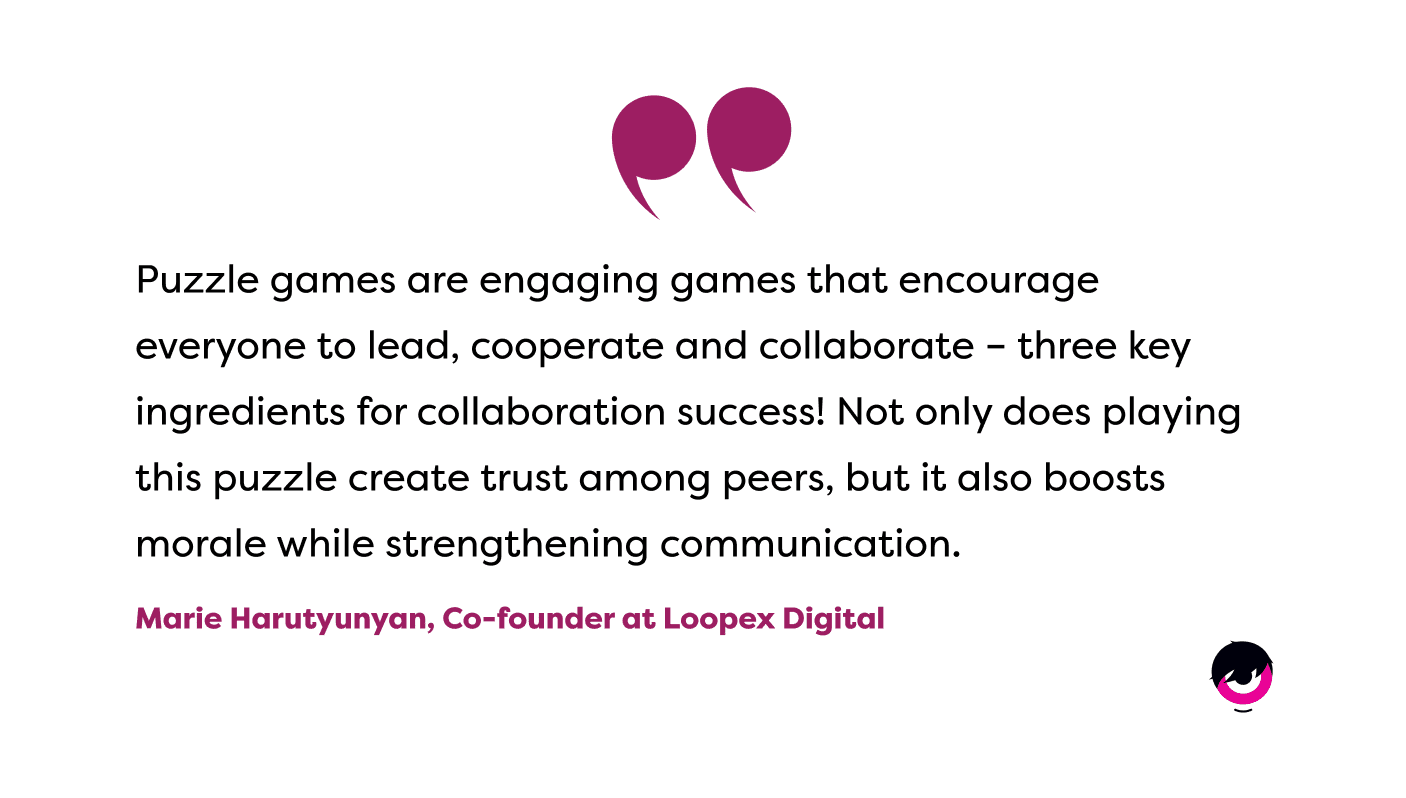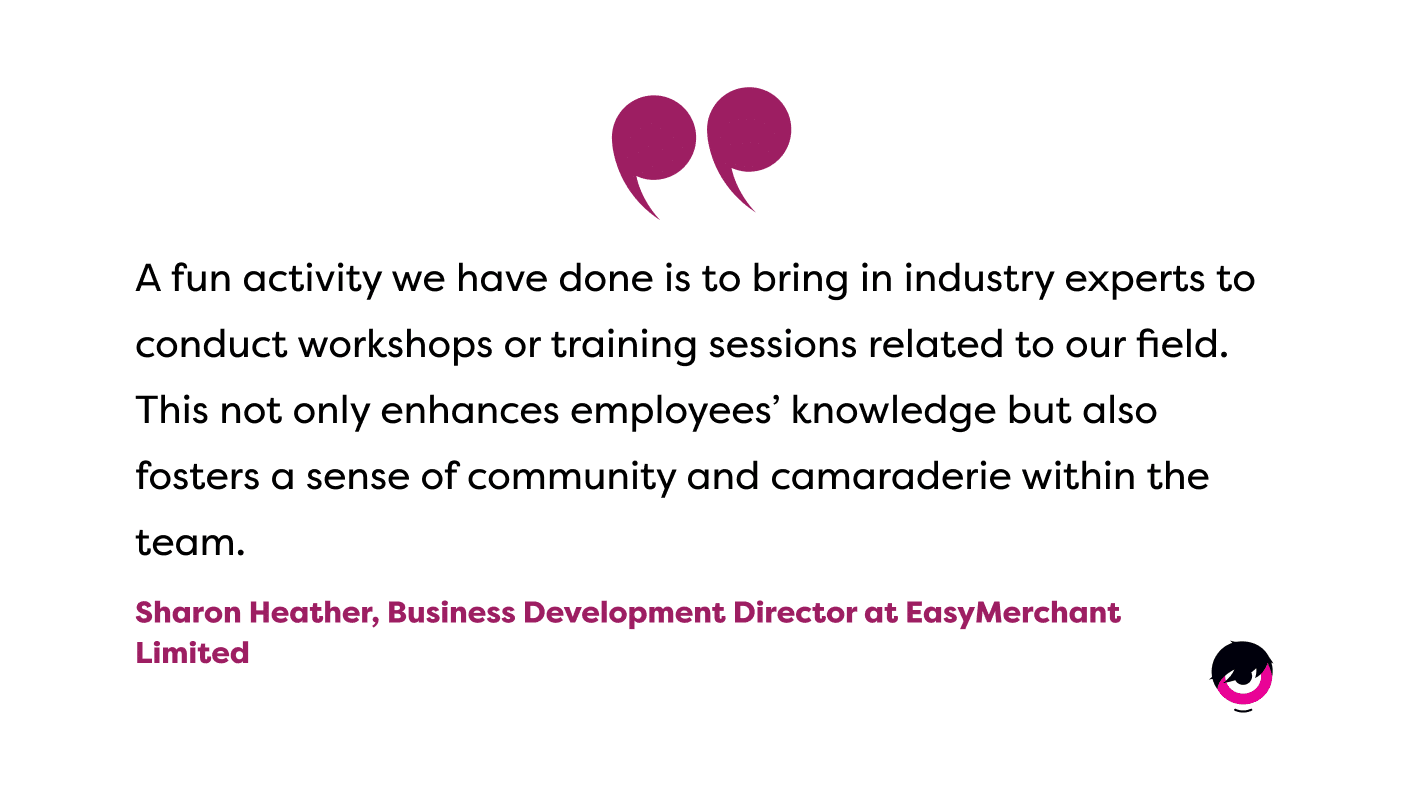Finding ideas for team-building activities is easy enough… Right? The thing is that many team-building activities are dreaded by employees, leading to poor participation rates and disengagement. So, how can you ensure you organize successful team-building events that will attract the most participants? Read on to discover tips from managers and fun team-building activities that will foster team cohesion and positive memories in the workplace!
Fun Games and Conversation Starters to Break the Ice Once and For All
It might be difficult for your employees to go beyond surface-level interpersonal relationships. However, these ideas of icebreaker team-building games will foster team spirit!
1) Puzzle games: Puzzle games are classic games that require critical thinking, and they are also a great team-building exercise.
“Puzzle games are engaging games that encourage everyone to lead, cooperate and collaborate – three key ingredients for collaboration success! Not only does playing this puzzle create trust among peers, but it also boosts morale while strengthening communication.” – Marie Harutyunyan, Co-founder at Loopex Digital
2) Movie screenings: Movies are great conversation starters. You can ask your teams their favorite movies or movie genres and let the visual magic do the rest!
3) Board game nights: They are easy to organize, cost and time-efficient, and people pleasers. Everyone can join in with their favorite board games and chat with their colleagues.
4) Book clubs: Book clubs encourage employee participation in corporate activities – they can vote for the book they want to read each month – and create opportunities for in-depth conversations between employees from different teams and departments. They are also perfect activities for remote workers.
5) Escape rooms: These activities are great because they require problem-solving skills and communication skills to be completed. Furthermore, they are accessible to the entire team.
6) Scavenger hunts: Like escape rooms, they encourage teamwork and communication skills. They can also be organized quickly, and you can prepare a prize or recognition messages on pieces of paper that the employees will find along the way.

Ideas of Activities to Promote Physical and Mental Health in the Workplace
Why not tackle two issues at once by organizing team-building activities focusing on your staff’s global health? Healthier, happier employees are known to be more productive and engaged. Here are some ideas that can help you:
7) Workations: Working in a different environment might be the change of pace your team needs. Workations prevent burnout, reduce stress levels, and various team-building activities can be organized throughout the stay. For a smoother organization process, you can enlist the help of a business travel agency.
8) Sports events: Healthy competition is nice, but relationship building matters the most here, so remember to make the sports events accessible to all and favor team sports to encourage team collaboration.
9) Team breaks: You can go beyond the usual reminder to take breaks and organize weekly team breaks where everyone goes out to lunch, settles comfortably in the resting area, or takes a nap, depending on individual needs!
10) Outdoor activities: Getting out of the office or the house to enjoy a picnic, take a hike, or a simple walk in nature is always appreciated. Employees will be less likely to talk exclusively about work and will enjoy a breath of fresh air.
11) Yoga sessions: Yoga is a good workout option because of its accessibility and practicality. However, any workout break is an excellent idea as it reduces stress and encourages teams to move throughout the day.
Themed Activities that Fit Your Company Culture
Team-building activities are a great opportunity to promote your company culture and values. For example, if you are working for a nonprofit organization, it might be a good idea to organize team activities related to your mission. Here are helpful examples:
12) Team volunteering: Coming together to accomplish a common goal is a great use of everyone’s time and creates strong bonds between team members. These volunteering activities should take place during working hours and reflect the company’s commitment to a worthy cause.
13) Recognition events: Recognition galas are great opportunities to express gratitude among team members. Everyone can appreciate coworkers’ accomplishments or positive attitudes, which creates close-knit interpersonal relationships in the workplace.
14) Welcome, birthday and farewell parties: Building a positive employee experience starts from the very first day in the company and continues through the last work day. Organizing onboarding, birthday and farewell events helps employees feel appreciated throughout their lifecycle while maintaining a great team dynamic.
15) Company-wide events: Celebrating corporate achievements or milestones is a great way to increase employee engagement. You can also organize holiday events yearly by throwing a Halloween party or an end-of-year get-together.
16) Gift exchanges: Corporate gifts are not only a great way to express >employee recognition, they can also be used to strengthen teams by organizing annual gift exchanges. Everyone loves to see kindness in the workplace!
Skill and Knowledge Development Activities
Who doesn’t like to learn new things while having fun? You can turn learning opportunities into team-building activities, and vice-versa. Here are some helpful ideas:
17) Industry and professional seminars: They might not be directly associated with fun times, but these events are great ways to strengthen bonds among teams while providing learning and networking opportunities.
“A fun activity we have done is to bring in industry experts to conduct workshops or training sessions related to our field. This not only enhances employees’ knowledge but also fosters a sense of community and camaraderie within the team.
For instance, our sales team enjoys attending sales conferences and events, which provide them with networking opportunities and help them stay up-to-date with industry trends, so we have worked with other businesses in our area to set up our own networking coffee mornings. This not only got the team networking and honing their skills, it brought opportunities to find out how we could work with local businesses.” – Sharon Heather, Business Development Director at EasyMerchant Limited
18) On-site training focused on teamwork: Who said that learning has to be boring? Team training can be focused on soft skills such as teamwork and collaboration skills. These learning opportunities will also increase team productivity.
19) Employee knowledge-sharing meetings: Every single employee has unique sets of skills and knowledge to bring to the table. You can benefit from these individual strengths by organizing weekly roundtable discussions during which a team member can talk about their work, their professional skills, or new tips and tricks they just learned.
20) Lunch and Learns: These lunches are well-known and well-loved for a reason: they’re effective, and everyone can join during their midday breaks. You can invite field experts to share their knowledge and everyone in the team gets the same learning experience, which can lead to interesting discussions.
21) Activities based on individual skills and hobbies: For more personalized takes on team building activities, you can survey your teams and find out what their specific interests are. If an employee is really good at sewing, it’s your cue to organize a sewing course during which they will be able to share their tips if they wish to.
22) Trivia games and quiz nights: Trivia questions and games are a great way to learn while having fun. These types of activities are also easy to organize, and everyone can actively participate in them. You can try dividing the teams by department.

Don’t Forget Your Remote Teams!
It bears reminding that remote employees have to be included in your team activities planning. Our examples of team building activities are easily adaptable to remote and virtual contexts, so feel free to tweak them to your needs and let your imagination do the rest!
Furthermore, managing remote teams and measuring their satisfaction can be tricky. Pro tip: send regular pulse surveys to analyze their levels of engagement and stay on the right track throughout the year!
Nowadays, you need to go beyond the usual team lunch to increase employee engagement levels and build a sense of community in the workplace. While good intentions are great, actions are what will make a difference in employee happiness and retention. Feel free to use our team building activity ideas and adapt them to your needs with creative thinking to find the perfect recipe for your reality.
Psst… Here are the best HR memes to share during team events!
Survey your employees with our free template:
It’s the best way to improve employee experience in your organization!

